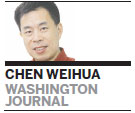There is little doubt, to people both in and outside China, that such a US strategy is aimed at China.
China's foreign ministry has described the US alliance as a Cold War legacy. To some Chinese, it is also unfair for the US to use an alliance against a non-alliance country.
At a time of partisan divide in Washington, building and strengthening US security alliances seems to have a consensus. That includes efforts to build up an alliance of convenience with Vietnam, a country with which the US has little in common in terms of values and political systems, but a country that does have territorial maritime disputes with China.
Thomas Christensen, a professor at Princeton University and a deputy assistant secretary of state for East Asian and Pacific affairs from 2006 to 2008, has been a sharp critic of Obama's pivot to Asia policy, but he also advocated building a US security alliance in dealing with China.
In a talk at the Center for Strategic and International Studies a week ago, Christensen said he hoped such an alliance would help shape China's choices for a peaceful rise, but he also admitted the possibility of sending a signal to China to speed up its military modernization.
So far there is no sign that the Chinese government will change its non-alliance policy anytime soon, but Yan Xuetong, dean of the Institute of Modern International Relations at Tsinghua University, has long advocated that China change its policy and build up its own alliances.
In an article titled China-US Competition for Strategic Partners, published on the China-US Focus website last month, Yan argued that for China to become a superpower like the US, Beijing needs a new strategy that fully embraces genuine alliances, and not just so-called "strategic partnerships."
According to Yan, China has established about 70 "strategy partnerships" or "cooperation partnerships," including with many of American allies, such as Britain, France, Germany and Italy. These friendships are mostly economic in nature, not traditional, full-fledged military alliances, whereas the US has about 60 full-fledged treaty allies that involve military cooperation.
He said China needs more military allies in order to maintain a political balance in East Asia in terms of strategic competition with the US. He said a deep bench of allies for China would provide a counter-balance to America's reach, and make the world a more peaceful place.
Most people in the West may prefer a unipolar world led by the US, but not all the world sees it that way. A global balance of power tipped in favor of any one country creates more problems than it solves. All ASEAN states know that the only way to maintain ASEAN's leading role in regional security affairs is to maintain the balance between China and the US and force them to compete for ASEAN's support, he wrote.
Yan dismissed concerns that the world might fall into a new Cold War if China adopted an alliance strategy. He argued that an alliance network is only one of the necessary conditions for a Cold War, rather than a sufficient one.
"In fact, there is little chance of a new Cold War given that ideology is not a core conflict between China and the US. Millions of Chinese and Americans visit each other's country annually, not to mention the extensive economic ties between these two countries, factors which also reduce the chance for a new Cold War in the visible future," Yan wrote.
While Yan talked about forming alliances first with countries in its neighborhood, such as Cambodia, Laos and countries in the Shanghai Cooperation Organization, and then with some US allies and partners in the region, he did not specifically name Russia, a country with huge natural resources and a strong military.
A possible China and Russia alliance has been a hot topic in Washington for the past year, following the drastic deterioration of US-Russia relations and the threat to China posed by the US rebalance to Asia.
Early this year, Joseph Nye of Harvard University argued that a China-Russia alliance is less likely given some of their differences, but the US has huge differences with some of its security allies too.
It has been wise for China not to resort to alliances to engage in a largely zero-sum game, but if the US continues to play its card of building up alliances against China in its neighborhood in an aggressive way, what Professor Yan has advocated may win more attention and support in China.
Contact the writer at chenweihua@chinadailyusa.com